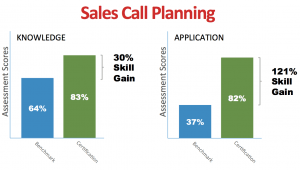“Big data” is a hot topic in the business world these days, but it isn’t a term you hear in connection with sales training. If there is one thing the sales-training industry has always lacked, it is a solid, validated, data-driven methodology to evaluate the claims that suppliers make for their programs.
Indeed, the industry’s motto ought to be, “Sales training: Long on promises, short on proof.”
That is about to change. Let me explain.
Beginning in 1995, my company, The Sales Board, formed a development team of software engineers and psychometricians to create a validated instrument that would reliably measure factors including these: How much knowledge a salesperson has about the selling skills that are critical to success; how much that knowledge level improves after training; and how well the person is able to use the knowledge on the job. That last piece—measuring the application of knowledge and skill on the job—goes a giant step beyond merely measuring what salespeople know.
This remains the only validated instrument for measuring those factors, and for 20 years we have used it to evaluate the impact of Action Selling ® training. We have collected data on 400,000 salespeople from more than 3,500 companies in a broad range of industries. Our SQL relational database contains about 78 million data points with a two-decade time span. Digging into that gold mine yields some extremely reliable—and therefore valuable—information.
Did they learn critical skills?
Action Selling ® rests on the research-proven premise that there are five critical selling skills that share two key characteristics. First, they are the skills that have the most impact on sales performance. Second, they can be taught; that is, they are not natural “gifts” or innate personality traits.
Those five critical skills are:
- Buyer/Seller Relationship
- Sales Call Planning
- Questioning/Listening
- Presentation Skills
- Gaining Commitment
The “big data” we have amassed over 20 years allows us to look at each of those skills (and at all five together) and determine the average starting point for students, prior to training, in both knowledge and ability to apply the knowledge. We also can determine the levels that students reached upon certification in each skill. We then can calculate (in percentage terms) the skill gain that occurred, in both knowledge and application, as a direct result of sales training.
The chart below shows what that looks like for the first critical sales skill, Buyer/Seller Relationship.

Notes:
- Blue bars indicate average assessment scores prior to training. Green bars indicate assessment scores upon certification.
- Two bars on the left indicate Knowledge measurement. Two bars on the right indicate Application measurement.
Remarkable findings about this skill
- Prior to training, many salespeople were unaware that customers make a consistent series of five sequential buying decisions in the course of buying a product. (Understanding those decisions, and knowing how to address them, is at the heart of building a successful buyer/seller relationship.)
- Post-training salespeople, at certification, made an enormous jump (35 points) in Knowledge.
- Application scores moved up dramatically (60%). However, there is more room for growth, as the gap between Knowledge and Application scores is sizeable (19 points).
- The key improvement opportunity with this skill is to boost a sales team’s ability to orchestrate a reliable sales cycle.
This is just a taste of the kind of detailed insight you can gain into a sales training program if you, a) start with the right program and, b) take the trouble to evaluate it in a clear-eyed, data-driven way.
In the next few articles, I will show the average skill gains that our data demonstrates for the other critical skills, and for all five Critical Sales Skills taken together.
For information about how to make sales training pay huge dividends, contact Action Selling ® at (800) 232-3485 or visit www.actionselling.com
For a far more complete look at findings from The Sales Board’s 20-year sales-training evaluation project, see my current white paper, Big Data Reveals the Best Way to Develop Sales Talent.

